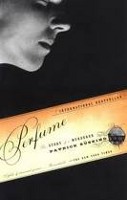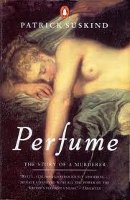

It's never too late to read a good novel; but if you haven't read Süskind's Perfume yet, now is the time to do so. A combination of breathtaking suspense and unparalleled olfactory prose, this literary debut was one of the greatest worldwide bestsellers in the mid '80s. The eponymous movie, directed by Tom Tykwer, will premiere in a few months. This may be your last chance to apply your personal, unbiased imagination to the story.
Perfume is the horrifying tale of an 18th century Parisian orphan, Jean-Baptiste Grenouille, whose primal curse — his unhuman lack of body odor — is paradoxically contrasted by a superhuman sense of smell. While the 'demonic' absence of a personal smell makes him a social outcast, Grenouille's interior world is completely dominated by olfactory perceptions: the boy thinks, dreams, lives in terms of scent. Throughout his childhood, he avidly memorizes the fragrant landscapes surrounding him; in a desperate attempt to regain his own humanity, he becomes obsessed with the idea of creating the most sublime perfume imaginable. As a perfume apprentice, he quickly reveals his uncanny talent for fragrant compositions; but conventional methods will not lead him to his ultimate goal. For his definitive masterpiece, Grenouille resorts to dramatic sacrifices.
I have to admit that my first encounter with Perfume, more than ten years ago, can't be described as love at first sight. I'm not a fan of the horror genre, and I found the opening scenes in the book rather revolting. But when I gave it a second chance, several years later, I succumbed to the captivating force of the book: I simply couldn't put it down. Even now, when I browse through my copy of the Dutch translation, I'm tempted to go back to page one, and read the whole thing from cover to cover. So what is this fascination all about?
First of all, Perfume is based on proper historical research. Whether the author describes a particular setting (the streets of 18th century Paris, the opulent interior of a Parisian boudoir) or a specific method in perfumery (maceration, enfleurage), everything is described in minute detail, and with great accuracy where possible. Despite it being a fictional work with highly surreal elements, Süskind made sure to get his facts straight. I like that.
The author's striking olfactory descriptions are another distinctive trait of this novel: few writers truly master this specialism. You can almost smell the fish market, the tannery, or the perfumed wigs as you turn the pages. The smells described in Perfume are an integral part of the story; more than that, they represent the main character's relation to lust, love, hate, and redemption. No wonder people were skeptical about a screenplay adaptation.
And finally, as with any good book, the plot has a rather surprising twist to it. You know it's the story of a murderer, but you'll have to read it until the last page to appreciate its complexity. So if you haven't done that yet, here's my advice: don't wait for the movie, no matter how good it turns out to be. You'll have plenty of time to watch that later.
Patrick Süskind studied medieval and modern history in Germany and France, and worked as a screenwriter in the 1980's. He doesn't do interviews; he spends his time between Munich and Paris, leading a reclusive life.
Perfume: The Story of a Murderer
Patrick Süskind
Available from various publishers
Original title: Das Parfum, Die Geschichte eines Mörders (1985)
Update: see Marcello's review of the new Perfume movie directed by Tom Tykwer.
A wonderful review of a fascinating book, M. As far as the screen adaption goes, I am hopeful, for I feel it's in good hands with Tom Tykwer in the director's chair.
I do wish I understoon German, however. There is something about the English translation that seems incomplete. I had initially chalked it up to some defect with the writing, but upon finishing the book I decided it might be more a reflection of the difficulties in moving the written word from one language to another.
Thanks, Katie. Unfortunately I'm not familiar with the English translation. Are you referring to the version by John E. Woods?
I'm unsure – I read the hardcover version printed by Vintage International, and I do not recall at all who was credited with the translation. I believe it is the same however?
When reading it I would occasionally find myself thinking, “wait, how did we get here?” or there'd be something from the character that came up that seemed inorganic from what I'd read so far and wondered, “so where did this come from?” It's like there were slightly choppy transistions, a certain roughness of detail that made me feel I had missed something. Yet I would turn the pages back to find that missed something and it would not be there. Obviously it wasn't a big deal, and I followed the story well enough 🙂 It's just that I kind of would like to understand those inflections of meaning and connotations of the original language the story was penned in.
Hmm… let's blame the translator, when there's something funny with the writing, eh, K? LOL! It was a first novel; it's quite possible PS hadn't completely mastered his craft yet.
I read it in translation; didn't find it wanting. Totally engrossing.
I'm not looking forward to the film, though. I have a feeling it'll be disappointing like the screen adaptation of Captain Corelli's Mandolin, for instance. Or The Shipping News.
I read this book a few years ago. It's absolutely a must for anyone who's into scent – I found it captivating. I'm a fan of the dark stuff, too, so it appealed to me in that way. Thanks for the lovely review, Marcello.
I have just purchased this book today! Not easy to find. Read the first few pages, having a break here, and will probably be up most of the night, engrossed.
HelenAnn, your comment about the availability of Suskind's book surprised me a little, but I'm glad you were able to find a copy anyway.
I hope you will share your final thoughts on this book. Do let us know! 🙂
Olfactory sensation, it's a sweet damnation! This book is simply brilliant. Never before have I been grasped so intensely by a book. Especially considering how bizarre and twisted the story and concept are. I have a terrible sense of smell and to read the literal embodiment of all these scents is an epiphany, a real mind bender.
Suskind frames the world in a way that many of us will not have experienced before, not with landscapes and visualisation, but with references to smells! Not only are his descriptions vivid and powerful, but his story telling is first rate. You will feel this as you find yourself surprised as you begin to sympathise and feel sorry for a man who is at the end of the day a spiteful, jealous murderer!
Brush all the high brow aside, and this book is simply a great read.
I am a singer-songwriter and this book is one of my most faithful companions. I have read it so many times and found myself meditating on the concepts and writing so often that it has inspired me to write a song – please please please check it out and let me know what you think!!!!! You can find the song and more trivia about the book at http://www.myspace.com/patricksuskindsperfume
A great book. Every time I smell Mitsouko, I have the feeling that a person is there and I think again of The Perfume and its brilliance.